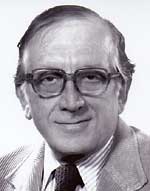Robert Bowman, professor emeritus of health behavior and health education, died Jan. 15 in Racine, Wis., at age 89. He was born in Racine in 1914 and graduated from the University of Wisconsin-Milwaukee in 1937. He went on to earn a master’s degree from Marquette University and a second master’s, as well as his doctorate, from U-M.

Following an early career as a biology teacher and head of the science department at Wisconsin’s Cudahy High School, and as a consultant in health education in central Michigan, Bowman joined the faculty of the School of Public Health (SPH) in 1949. He retired in 1980.
During his three decades at SPH, he served as assistant to the dean and secretary of the faculty for 10 years. He was a consultant in health education to several state and national organizations, including the Indian Health Service and the Migrant Health Branch of the U.S. Department of Health, Education and Welfare, and the American Cancer Society of Michigan. He also directed research programs in health education for the Cancer Control Program and the Migrant Health Program of the U.S. Public Health Service.
Bowman played a key role in the education of more than 750 SPH students who went on to hold positions of leadership throughout the world at every level of government, in voluntary health agencies and in the World Health Organization. Students valued Bowman as a good listener and a sage counselor and mentor.
“Bob was one of the early specialists in health education media and materials, and he developed a state-of-the-art media laboratory in the school,” says Scott Simonds, professor emeritus of health behavior and health education and a former colleague of Bowman. “His work had particular relevance for students abroad, who were just launching the field of health education in their respective countries.”
A member of several state and national organizations, Bowman served as president of the Michigan Public Health Association (MPHA) and president of the Great Lakes Chapter of the Society for Public Health Education (SOPHE). He held various offices in the American Public Health Association, and for several years was editor of Health Education Monographs, a leading health education journal.
Among his many honors and awards, Bowman was named a distinguished fellow of SOPHE, a distinguished alumnus of the University of Wisconsin-Milwaukee, and an honorary life member of MPHA. He also was inducted into the Washington Park (Wisconsin) High School Hall of Fame.
Bowman’s wife, the former Helen Elizabeth Schneider, died in 1995. He is survived by his sister-in-law, Marjorie Bowman; three nieces, seven nephews and numerous cousins.
Marvin Becker
A leading scholar of medieval, renaissance and early modern European history, Marvin Becker, 81, died in his sleep from pneumonia at University Hospital Jan. 11. He was professor emeritus of history who taught for 22 years and was chairman of the Department of History from 1977-79.

Becker was born July 20, 1922, in Philadelphia and received his doctorate from the University of Pennsylvania in 1950. He was a veteran of World War II.
During an academic career that spanned more than 45 years, Becker taught at Western Reserve University in Cleveland and the University of Rochester, among other institutions. He also was a visiting professor at various universities, including the University of Wisconsin-Madison, Columbia University, Johns Hopkins University (JHU), and the universities of Arizona (Tucson) and Toronto.
Honors bestowed on him include a post-doctoral Fulbright research grant to Florence, Italy; a Guggenheim Fellowship; several American Philosophical Society Fellowships; and a fellowship from the American Council of Learned Societies, all to Italy.
Becker was Harvard Fellow in Renaissance Studies at I Tatti in Florence (1963-64); a senior fellow at the JHU Center for the Humanities from 1966-67; and a fellow at the Institute for Advanced Studies at Princeton University from 1968-69. In 1992 he was awarded membership in the Society for Scholars at JHU for Distinguished Research.
He was editor of the book series “Studies in Medieval and Early Modern Civilization” for U-M Press from 1988-2004. Under his stewardship, the press published 17 scholarly volumes. His major publications include: “Florence in Transition,” Vols. I & II (Johns Hopkins Press, 1967, 1968); “Medieval Italy: Constraints and Creativity” (Indiana University Press, 1981); “Civility and Society in Western Europe 1300-1600” (Indiana University Press, 1988); and “The Emergence of Civil Society in the 18th Century” (Indiana University Press, 1994).
In November 2000, two of his former graduate students, Professors Carol Lansing and James Banker, organized a conference in Becker’s honor at the University of California, Santa Barbara, inviting his former graduate students and many of his professional colleagues. As an outgrowth of the conference, a book of his writings was published as “Florentine Essays: Selected Writings of Marvin Becker” (U-M Press, 2002).
“Marvin had an astounding combination of factual mastery and philosophical sophistication. To talk to him was to enter a world of intellectual inquiry which was passionate and open-ended,” says Professor Victor Lieberman, a colleague at U-M.
Becker is survived by his wife of 60 years, Betty Becker, who assisted him with his research; two daughters, Wendy Cranfield and Professor Dana Becker; and three grandsons, Oliver Mill and Adam and Benjamin Cranfield. Becker has been cremated. A memorial service will be announced at a later date.
—Submitted by the Department of History

